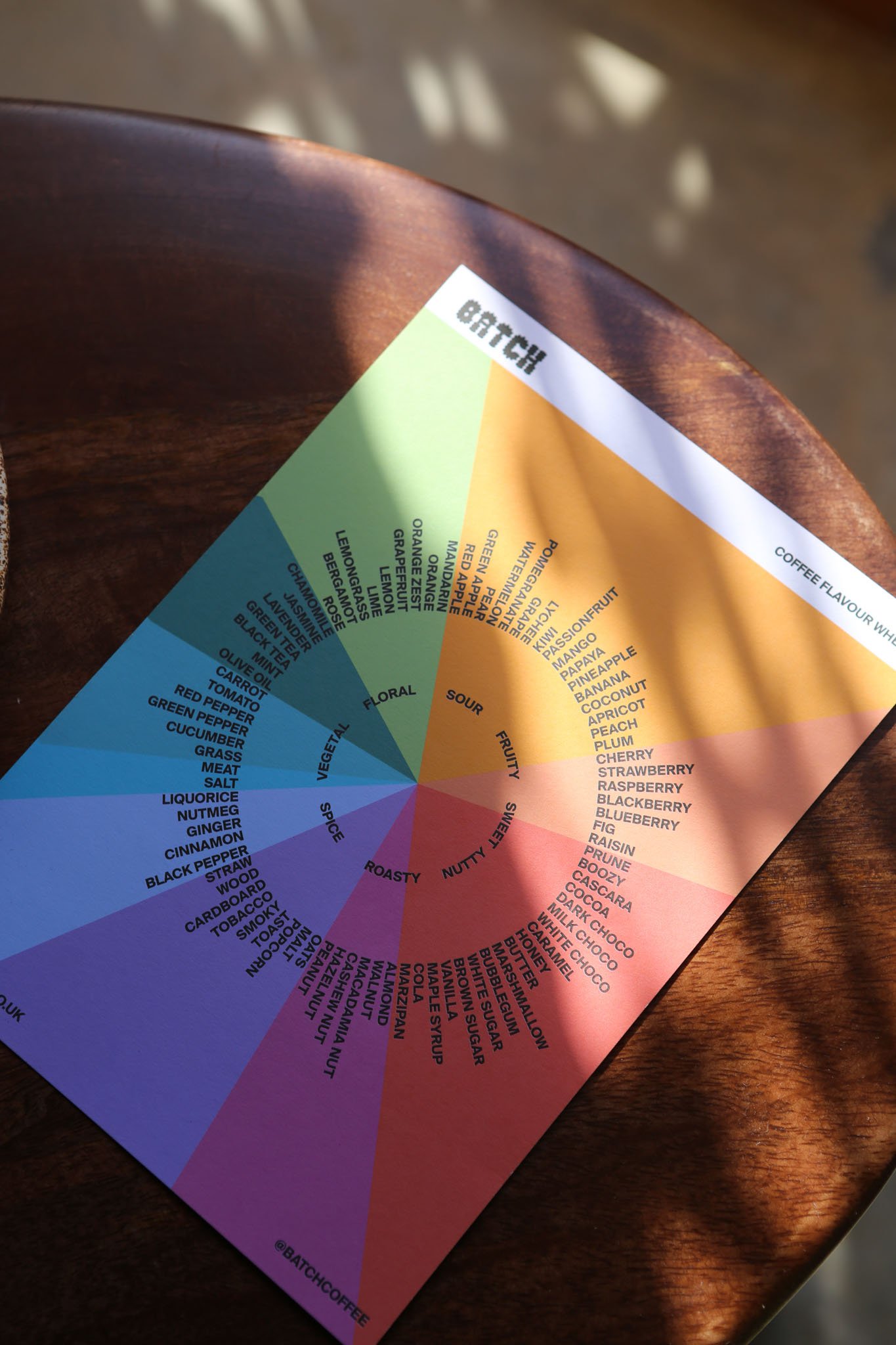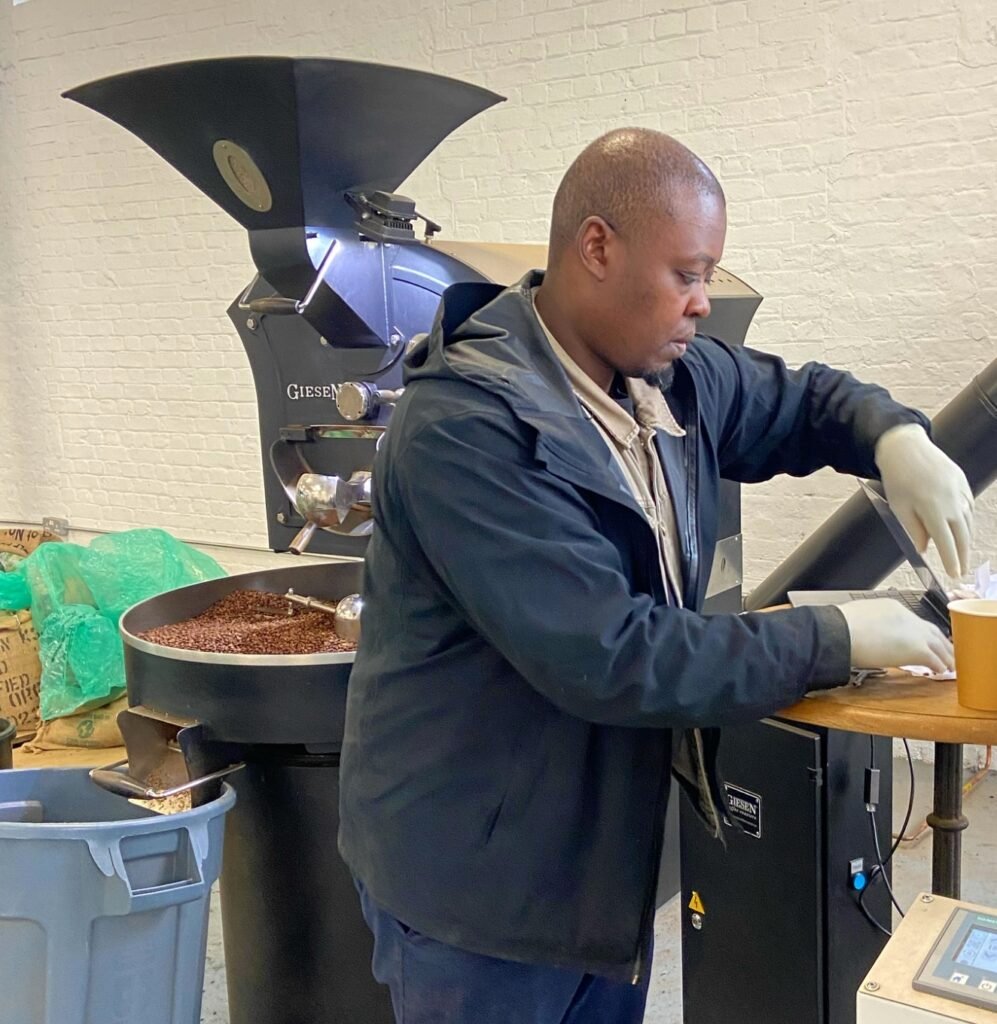Tom’s top 7 milk frothing jugs
The Best Jugs For Frothing Milk 2025
I’ve spent years working with milk frothing jugs, and I can tell you that a good one is an essential part of any home barista’s coffee arsenal.
Through my experience, I’ve found that a well-designed milk pitcher can be the answer to all of your latte art problems.
If you want that silky, perfectly textured milk, I can’t stress enough how important a proper jug is.
While there are various ways to make frothy milk at home (like using a French press to add air by rapidly plunging, or stirring and whisking to create foam, or even using an electric milk frother), I’ve found these methods to be messy and require extra work.
If you want that sexy frothed milk, a jug is an essential tool.
Plus, in my testing, these alternative methods won’t texture the milk and produce that delicious velvety microfoam that sits atop your favourite milk-based espresso drink.
So, let me share my insights about milk frothing jugs…
| Model | Sizes Available | Material | Price Range | Best For | Dishwasher Safe | Special Features |
|---|---|---|---|---|---|---|
| Rhino Pro Milk Pitcher | 350ml, 600ml, 1000ml | 303 Stainless Steel | ££ | Professional Baristas | Yes | Volume markers, 1mm thick walls |
| WXJ13 Milk Jug | 350ml, 600ml, 900ml | Alloy Steel | £ | Beginners | No | Comes with barista kit |
| Motta Teflon Foaming Jug | 350ml, 500ml, 750ml | Stainless Steel with Teflon | ££ | Professional Use | Yes | Color coding options, non-stick |
| Handle Free Milk Jug | 600ml | Stainless Steel | ££ | Latte Art | Yes | Insulated sleeve |
| Fellow Eddy Milk Pitcher | 350ml, 550ml | Stainless Steel | £££ | Design Enthusiasts | Yes | Fluted spout, sharp front crease |
| Vinekraft Milk Frothing Jug | 600ml | Stainless Steel | £ | Home Use | No | Built-in thermometer |
| MeelioCafe Milk Frothing Pitcher | 420ml, 500ml | Stainless Steel | £ | Wide Pour Latte Art | Yes | Wide spout, volume scale |
AUTHOR: TOM SAXON
Why trust me
Here at Batch coffee we pride ourselves on showcasing some the some of the best independent coffee roasters and their seasonal single origin coffees from around the world.
We are a team of coffee professionals that have worked in the industry all around the world.
Our reviews are all our own words and we only recommend products or services that we love.
Find below our 7 best milk frothing jugs (and 1 to avoid).
What Makes a Good Jug For Frothing Milk?
If you are serious about making great coffee at home, investing in a high-quality milk frothing jug is essential.
With so many options available on the market today, it can be difficult to know which one is right for your needs.
But by considering a few key factors you can easily cut through the noise:
Material
A good jug for frothing milk is one that is made of stainless steel, or other non-reactive material.
Reactive materials such as aluminum, which can react with acid in the milk, and plastic, which can leach chemicals into the milk, should never be used.
Stainless steel jugs might be a bit more expensive but can be great because they don’t let flavors from foods on your stovetop seep into the milk.
Cheap plastic jugs are best avoided because they can leach chemicals into the milk and are particularly bad for a dishwasher.
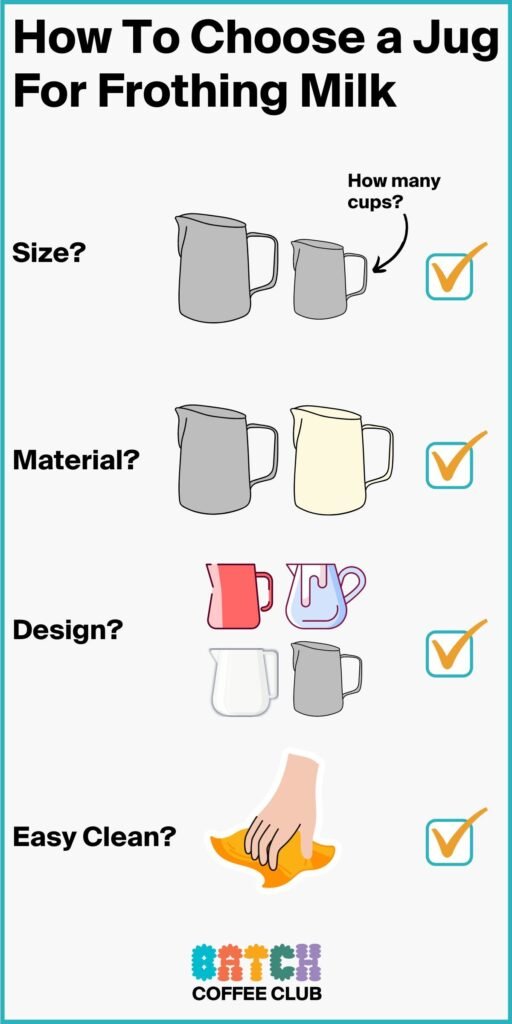
If you must use a plastic jug, try to avoid using something that has been previously used or washed with detergent or bleach.
Quality and Design
The next two factors are quality and design. With these in mind, you can choose a milk frothing jug that will produce great-tasting coffee every time.
It’s very important to make sure the jug you use for frothing is sturdy.
You want a jug that can hold its shape and not collapse under pressure.
You want the spout to be designed so that the steamed milk can be steadily poured over an espresso to create some world class latte art.
Size
Make sure that you are purchasing the correct size jug for your coffee needs.
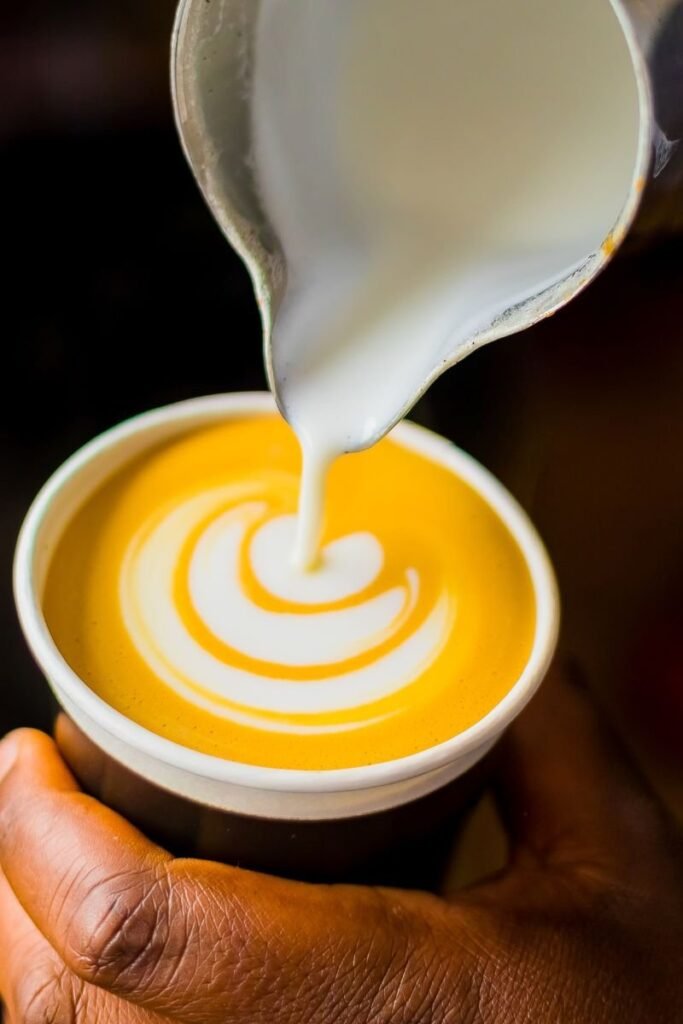
Milk frothing jugs come in a variety of sizes and it depends on how many coffees you want to make at once.
Easy Clean
You also want a jug that’s easy to clean, as frothing milk can get quite messy!
There are different types of jugs and pitchers for frothing, each with their own benefits and drawbacks.
Top 7 Jugs For Frothing Milk
Just so you know. When you buy via the links on our blogs, we may earn an affiliate commission at no cost to you. Learn More
1. Rhino – Pro Milk Pitcher
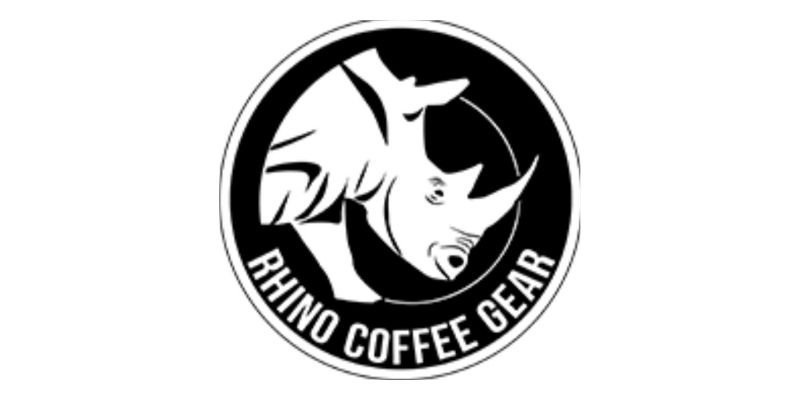
- Sizes: 350ml, 600ml, 1000ml
- Material: Stainless Steel.
- Value: ★★★★★★★★★☆
- Pros: ✅ Robust.
- Cons: ❌ Not For Beginners.
Rhino milk jugs are designed for baristas.
The strong sturdy body means that you can be as heavy handed as you like.
A nice feature that Rhino have added on the inside of the pitcher that reduces wastage and re-heating old milk giving you fresh steamed milk every time.
The unique etched volume lines give the you a reference point to fill the milk pitcher so there is a real reduction in wasted milk and better portion control.
The Rhino milk frothing jug is made from 1mm thick 303 stainless steel.
This gives you more time to control the milk steaming resulting in better-textured milk and more beautiful latte art, as well as amazing quality feel.
2. WXJ13 – Milk Jug
- Sizes Approx ml: 350ml, 600ml, 900ml
- Material: Alloy Steal
- Value: ★★★★★★★★☆☆
- Pros: ✅ Great for beginners
- Cons: ❌ Can Rust
A great jug and kit for beginners.
This durable jug comes with a barista kit, with Clip, Powder Shaker with Lid and Latte Art Pen for Hot Chocolate Cappuccino Coffee Latte Art pen.
It has a solid thermometer and the shaker and pen allows you to have fun with your designs.
some of these instruments may not be used by professional baristas but as a beginner to latte art and frothing milk a thermometer is an important but of kit.
It allows you to froth the milk and concentrate on texturing it without having to think about the tempreture
3. Motta – Teflon Foaming Jug
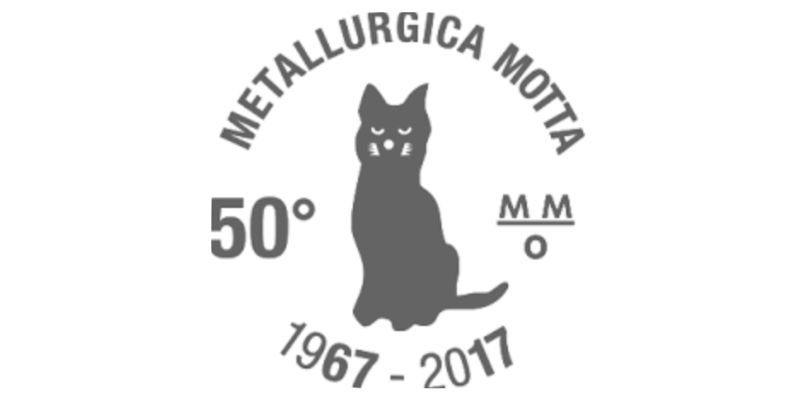
- Sizes (Approx ml/l): 350ml, 500ml, 750ml
- Material: Stainless Steel
- Value: ★★★★★★★★☆☆
- Pros: ✅ Ergonomic
- Cons: ❌ Unusual Pouring
Motta offer a different look to a milk frothing jug.
The Motta milk jug is an industry favourite and can be seen in many hipster cafes all over the world.
The jugs come in many different colours, which is great for baristas so they can colour code the different types of milk being used.
Also great for the home barista who potentially has an alternative milk consuming partner.
The sandblasted outer finish is durable and can last for years without scratching, and the teflon coating on the inside makes it quick and easy to clean.
4. Handle Free Milk Jug
- Sizes Approx ml: 600ml
- Material: Stainless Steel.
- Value: ★★★★★★★☆☆☆
- Pros: ✅ Easy Latte Art For Some
- Cons: ❌ Hard To Gauge Heat
Get closer to the action with this handleless milk frothing jug.
The insulated sleeve on this milk frothing jug allows you to steam the milk while holding the jug throughout the process.
Usually when steaming the milk, especially as a beginner you will need to hold the jug to gauge how hot the milk is before you turn off the steam wand. But as the milk reaches 65C the jug becomes too hot.
This guy lets you be part of the whole process and then continue to hold the jug throughout the pour, which for some is easier to control the flow of milk and create better latte art.
If you’re into stylish coffee equipment:
5. Fellow – Eddy Milk Pitcher

- Sizes Approx ml: 350ml, 550ml
- Material: Stainless Steel.
- Value: ★★★★★★★☆☆☆
- Pros: ✅ Design
- Cons: ❌ Harder to Pour
For all those instagram barista’s, here’s your milk jug.
The Eddy Steaming Pitcher, is the barista’s paintbrush for pouring precise latte art.
The fluted spout, unique sharp front crease, and tapered body work in tandem to Monet your milk.
The unique design like many of the Fellow products make it a popular choice amongst design enthusiasts.
Although the handle can prove slightly more challenging when pouring latte art, when you become accustomed to it you’ll be smashing out rosettas.
6. Vinekraft – Milk Frothing Jug

- Sizes: 600ml
- Material: Stainless Steel.
- Value: ★★★★★★★☆☆☆
- Pros: ✅ Great For Beginners
- Cons: ❌ Thermometer Not As Accurate
A great milk frothing jug to get started.
This milk frothing jug is great to froth milk for two cappuccinos at once.
It has a visible temperature change with a thermometer which allows you to froth milk for different drinks.
The one downside is this outside thermometer means it can’t be washed in the dishwasher.
It also comes with a latte art pen.
7. MeelioCafe – Milk Frothing Pitcher
- Sizes (Approx ml): 420ml, 500ml
- Material: Stainless Steel.
- Value: ★★★★★★☆☆☆☆
- Pros: ✅ Wider Spout
- Cons: ❌ Not That Robust
A wider spout means this milk frothing pitcher can create different latte art.
This is professional quality, dishwasher friendly jug for steaming milk.
It’ll perfectly fit 200 ml of cold milk ready to be steamed for a latte.
It’s nicely made, with a fairly accurate volume scale on the inside that will help you reduce milk waste.
The slanted top is a nice touch too. It has an ergonomic direct weld handle to balance perfectly on your fingers to help you with that latte art.
One To Avoid – Milk Server Jugs
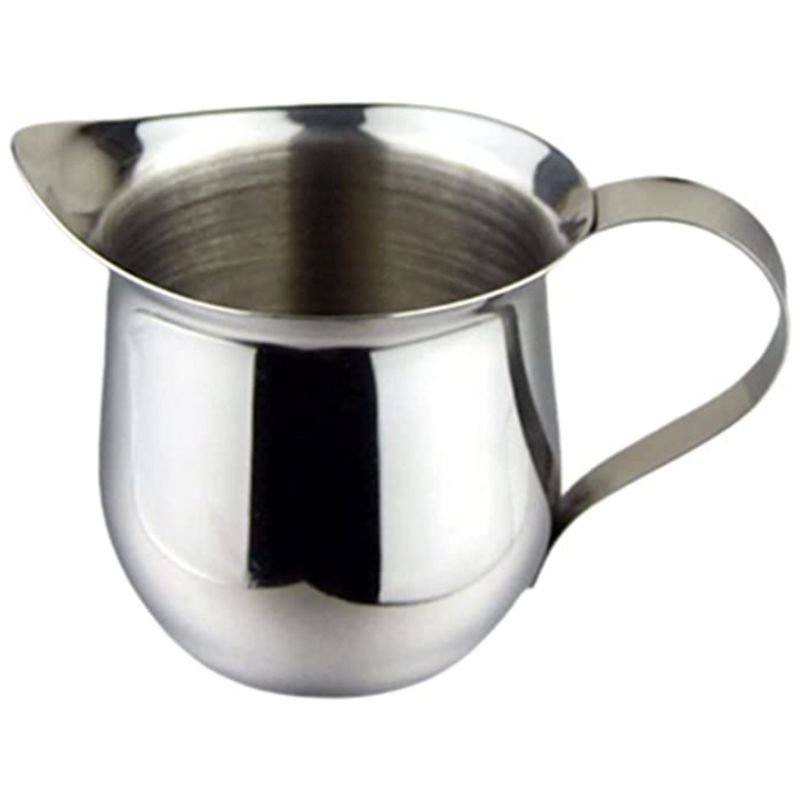
Milk servers rather than milk frothers.
Although these jugs may look appealing from a price point of view, they are not designed for the purpose of frothing milk.
They are designed rather for serving milk, hot or cold to add to americano’s or tea.
Although you can still technically froth milk in these jugs as they are made out of stainless steel, the shape isn’t designed for the flow of steaming milk and you may end up with hot milk all over the kitchen.
How do you froth milk?
It’s fair to say that there’s an art to frothing milk, one that takes practice and patience to master.
You can have the nicest shot of espresso in the world, but that latte or, cappuccino dies a death if the milk is poorly prepared.
It’s important to have the right mug for frothing milk and whilst we’ll get to just what kind of mug that is in more detail later on in the article.
For now, however, it’s safe to say that most jugs designed for the purpose have a handle, a spout and a frothing thermometer.
Whilst you don’t necessarily need this thermometer, if you have one which is permanently stuck to the side of the jug, you’re in good stead, but having one that sits in the milk can work as well, too.
Measure out the amount of milk required for the number of drinks being made.
So as not to make a giant mess on the floor and counter-top, it’s best not to overfill the jug and anything past the halfway mark can be considered doing just that.
Additionally, whilst you can re-froth milk, the quality is no where near as good as if you texture cold fresh milk.
Whether you choose dairy milk, or a vegan alternative is entirely up to you, but the less fat content there is in the milk, the less density you’ll find in the milk foam.
Before you start to steam the milk, ensure that the steam valve is open and purge any water lying in the wand.
Put the wand into the milk so that the point at which it releases steam is almost touching the bottom of the jug and turn the steam onto full.
Release the steam valve and hold your jug with two hands, slowly sliding the jug down, so that the lip of the wand is just under the surface of the milk.
Keep the lip under the surface of the milk, sucking in air so that there are no big bubbles and watch carefully as the volume of the milk rises.
When you’ve got adequate volume, put the lip of the wand back into the milk, at an angle so that the temperature is concentrated and the milk can be swirled around, mixing with the air that has been added.
As the volume steadily increases, it will almost fill the jug and it’ll be time to turn off the steam when the temperature hits 65 degrees.
Set the jug on the counter-top and wipe down the steam wand with a clean with a damp cloth. You can open the steam valve to help blast out any milk, so that you don’t have stale milk collecting bacteria and spoiling future froths.
Lift your jug again and give it a gentle bang on the counter as you swirl it round in the jug.
This takes a little bit of practice, so keep the cloth handy just in case!
Swirl and tap until your milk possesses a silky smoothness. This practice called polishing, is knocking the loose milk to the bottom of the jug, to get the foam extra silky.
The milk should be good to pour on that shot, or double shot of espresso to complete your drink.
How Do You Make Latte Art?
There are two ways to make latte art: by using an instrument to essentially draw on top of the latte or by pouring coffee directly onto the espresso.
When using a spouted jug, fill halfway to the bottom of the spout with your milk.
Both methods have their advantages and disadvantages, so it’s up to you which one you like best.
To begin, simply pull a double shot of espresso. Now carefully pour the milk in concentric circles starting from the center and working your way outward.
You want to penetrate through the crema of the espresso with the milk and create a layer or micro foam just underneath so that your beautiful design can sit on top.
Once you have filled three quarters of the cup slow the pour and watch the white of the milk appear on top of the coffee. It now up to you to gently create a pattern (start with a heart) by slightly moving the jug from side to side.
What Size of Jug Should You Use fo Frothing Milk?
You will need to find a jug that fits comfortably in your hand and allows you plenty of room to manoeuver the steam wand.
You can use a small (12-16 oz) or medium (24-32 oz) jug of milk.
Frothing milk in a large jug may result in too much foam and may not properly froth the milk.
The correct size of jug is important to ensure that the milk is properly heated and frothed when served to your customers.
What temperature of milk is best for a latte?
Ideally, you want to steam your milk at around 65 C for optimal flavour and texture.
One of the best ways to get started with steaming milk is to first use a thermometer to measure the temperature of your milk before you begin frothing.
Anywhere between 60 and 70 degrees should yield a rich creamy foaminess in your milk when aerated using the steam wand.
What is microfoam?
When steaming your milk, it is also important to pay attention to the texture of the foam that you are creating.
Ideally, you want to create microfoam – small, airy bubbles that form a creamy froth and give your coffee that velvety mouthfeel.
To do this, slowly move the steam wand just underneath the surface of the milk as it rises and resist the urge to move it in a back-and-forth motion.

